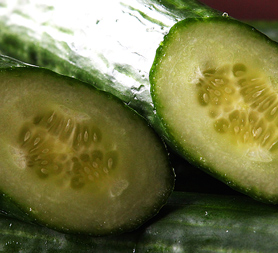Germany blames Spain for killer cucumbers
As the death toll from a deadly E.coli outbreak climbs to 14 in Germany, the Spanish government hits back at claims its vegetables are to blame.

Hundreds of Europeans have fallen ill, prompting the German government to issue a nationwide warning not to eat cucumbers, tomatoes and fresh leaf salads.
Russia has banned the import of vegetables from both Germany and Spain – after warnings that a deadly outbreak of ecoli is spreading across Europe.
In Poland, officials said that a woman has been hospitalised in serious condition after returning from a trip to the northern German city of Hamburg, where at least 488 cases of E.coli have been recorded. More than 300 remain seriously ill.
A further 94 cases of hemolytic-urenmic syndrome (HUS), a serious complication of a type of E.coli, have also been reported.
Authorities in Sweden said there are 36 cases of suspected E.coli in Sweden, all linked to travel in northern Germany. A small number of cases have been reported in Britain, Denmark, France and the Netherlands – all linked with visits to Germany.
Despite the warning, many Germans are still buying fruit and vegetables, taking advantage of the knock-down prices in the supermarkets.
Many shops have removed products from Spain, where the source of the outbreak is thought to have originated, and stocked up on produce from Germany, Holland, Greece and Turkey.
However, Spain has hit back, arguing there is no proof its produce was to blame for the E.coli outbreak.
Spanish denial
Spain is considering taking action after losing up to 8m euros a day since the blame game began. Diego Lopez Garrido, secretary of state for the European Union, said: “There is no proof of this and so we will demand explanations from who has attributed this matter to Spain.”
Clara Aguilera, Andalucia’s Councillor for Agriculture, said the damage done to Spanish farmers was “quite irreversible”.
“I don’t know why it’s more attractive for everyone to be against Spain…I hope it has nothing to do with commercial interests.”
Spain’s Secretary of State for European Affairs said that Madrid might take action against those pointing fingers at his southern European nation.
As usual in Germany, a lot of fuss is being made, I think. One generally has to wash fruits and vegetables, and I think if one does so everything is fine. Oliver Busz from Berlin
One consumer in Berlin felt “a little too much panic” was being generated over the food scare.
“Not everything is coming from Spain, and I also think that there is no final evidence yet, said 45 year old Oliver Busz.
“As usual in Germany, a lot of fuss is being made, I think. One generally has to wash fruits and vegetables, and I think if one does so everything is fine.”
In Germany, officials have not been able to determine the exact source of the breakout.
Other countries, meanwhile, were taking extra precautions over the bacteria scare.
Austrian officials inspected supermarkets on Monday and Czech officials said tests on 120 potentially tainted Spanish cucumbers pulled off shelves on Sunday are expected to be concluded in two days.
In Italy the country’s paramilitary Carabinieri tainted food squad has been on the lookout since Saturday for any contaminated cucumbers, checking imports from Spain, the Netherlands and other European countries.
So far, lab analyses have come back negative, and no cases of food poisoning have been reported.
An EU spokesman said on Sunday that two greenhouses in Spain that were identified as the source of the contaminated cucumbers had ceased activities.
The water and soil there are being analysed to see whether they were the problem, and the results are expected Tuesday or Wednesday, he said.